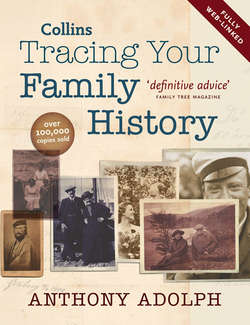Читать книгу Collins Tracing Your Family History - Ryan Tubridy, Anthony Adolph - Страница 75
BIRTHS
ОглавлениеThere is no point seeking records unless you knowin advance that they are likely to provide you with information you actually want. Here is a summary of what is on General Registration records. The indexes give:
The name (with initials instead of middle names)
The registration district where the birth was registered
A reference number
From September 1911, the mother’s maiden name
While births had to be registered, parents sometimes waited until later to decide their baby’s names. If you cannot find a birth you are sure should be there, try looking at the end of the list of people of the same surname for children entered simply as ‘male’ or ‘female’.
An original birth certificate of my grandmother Beryl Ivy Waters, 1912.
Birth certificates record the following:
Date and place of birth. If the exact time of birth is given, the child probably belonged to a set of twins. Look in the General Registration index for other children born in the same quarter and district who could be your ancestor’s twin.
Child’s name. Names can be added to or altered on birth certificates for up to a year after registration, unless a baptism has occurred. The child will appear in the indexes under both the original name (or lack of it) and changed or added one, so this is unlikely to cause problems for the searcher.
Name and occupation of father. Be cautious of occupational status: there are many instances of tailors’ clerks saying they were tailors, cottagers claiming to be farmers and so on.
Name and maiden name of mother. Former married names are usually given in the form; for example, ‘Rose Smith late Jones formerly Evans’. This means that Rose was born Rose Evans, married Mr Jones, was widowed or divorced and then married Mr Smith.
Signature or mark and address of informant. This was usually a parent. Signing with a mark usually indicated illiteracy but, of course, the signatory might merely have injured their hand. Sometimes registrars incorrectly assumed that poor people could not sign their own names and invited them to make their marks instead, and the signatories were simply too deferential to speak up.
